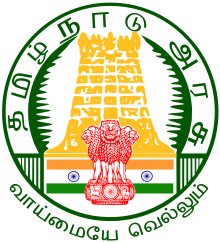The Hindu Religious and Charitable Endowments Department of the Government of Tamil Nadu manages and controls the temple administration within the state. The Tamil Nadu Hindu Religious and Charitable Endowments Act XXII of 1959 controls 36,425 temples, 56 mathas or religious orders (and 47 temples belonging to mathas), 1,721 specific endowments and 189 trusts.
 | |
| Agency overview | |
|---|---|
| Formed | 1960 |
| Jurisdiction | Tamil Nadu |
| Headquarters | Chennai |
| Minister responsible |
|
| Agency executives |
|
| Website | Official website |
In 1923, the Madras Hindu Religious Endowments Act was passed by Madras Presidency. In 1925, the Government constituted "The Hindu Religious and Charitable Endowments Board" consisting of a President and two to four Commissioners nominated by the Government to function as a statutory body. Subsequently, it was modified and in 1960 it became The Hindu Religious and Charitable Endowments Department by Tamil Nadu Hindu Religious and Charitable Endowments Act XXII of 1959 which came into force with effect from 28 April 1960, with C. P. Ramaswami Iyer serving as Chairman.[2]
Since 1991, religious and spiritual leaders have been involved in the maintenance and administration of the Hindu Temples and Charitable Endowments [citation needed]. However, the maintenance and administration of the Jain temples are under the administration of Jain religious and spiritual leaders.
The act controls 36,425 temples, 56 mathas or religious orders (and 47 temples belonging to mathas), 1,721 specific endowments and 189 trusts.
The department's inception saw numerous companies managing their Public Relations (PR) and Social Media Management. Currently, the responsibility is entrusted to the Chennai-based branding firm, 7 MILES PER SECOND, overseeing PR and Social Media Management operations.[3]
Annadhanam Scheme is conducted in 746 Temples and 50 to 300 devotees are provided with mid-day meals after Uchikala Pooja. Every year Special Rejuvenation camp is held for elephants from temples and mutts across Tamil Nadu and Puducherry. In 2020-2021, the 48-day long camp was held at Thekampatti on the banks of River Bhavani.[4] Spiritual and Moral Instruction classes were conducted in 485 temples by scholars. Various welfare schemes for temple employees and Nathaswara artists were also performed by this department.[5] This department publishes an electronic magazine called Thiru Koil[6] at its official website.
Below are a few temples maintained by the department. [7]